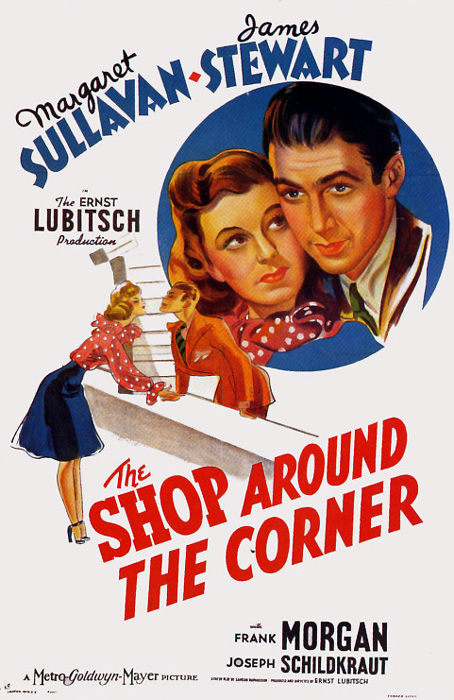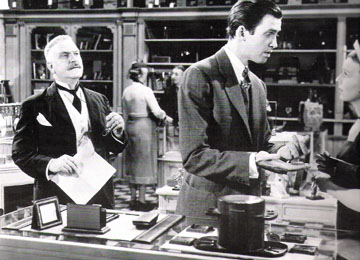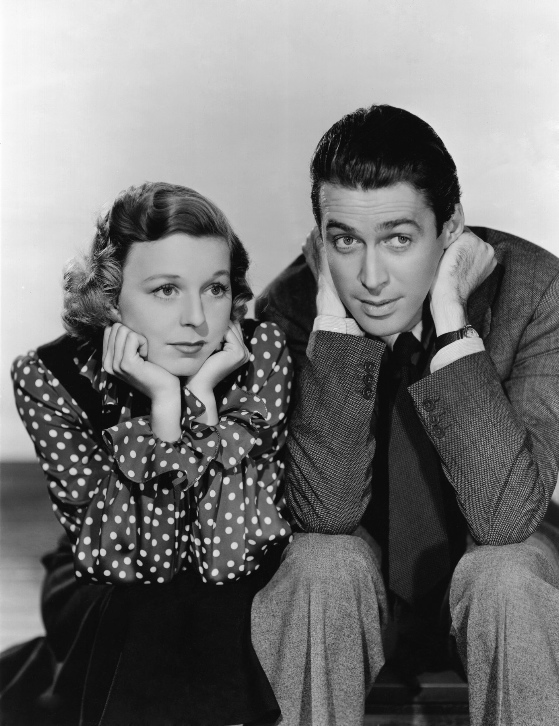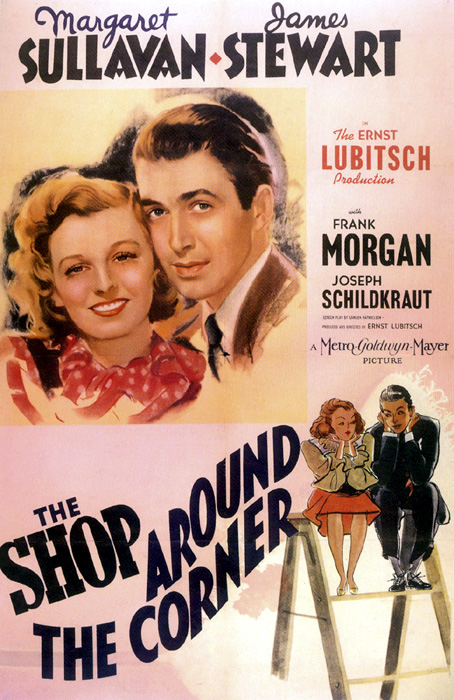
When Ernst Lubitsch, in his American movies, looked
back on the Europe he left
behind to pursue a career in Hollywood, he looked back at its glamor
and
sophistication, inflected it with a wry nostalgia, turned it into a
dreamscape. But he kept his emotional distance from it, precisely
because it was a dream, and he knew it — a world he was never really a
part of, though as a man of the theater and the cabaret stage and
cinema, he got close enough to observe it.
And then came The Shop Around the Corner,
towards
the end of his career, when he dropped his mask of sophisticated
reserve and looked back at the Europe he actually came from as the son
of a Berlin shopkeeper. The deep humanity and emotion of the film
revealed that his dreamy evocations of high-class European culture were
simply a displaced nostalgia for his youth, and when he engaged that
nostalgia directly, a sort of miracle occurred. Lubitsch opened his
heart for perhaps the first time ever in his work.
Lubitsch had always been amused by the flim-flam at
the
center of aristocratic charm, and was attracted to characters who
penetrated the
aristocrat's world by imitating the aristocrat's special form of social
theater — much as he had used the theater itself in real life to gain
status and wealth, and with them access to privileged circles. That
was why he retained a shrewd if affectionate cynicism towards the
people in his movies, a sense that everything they did was part of a
game. But in The
Shop Around the Corner his cynicism mutated into a kind of love —
still clear-eyed about human foibles but with a new sense that affairs
of the heart amounted to something more than delirious and delicious
role-playing.

There has never been a more heartfelt celebration of
petit-bourgeois life than The Shop Around the Corner, not least
because it's so nuanced. The financial terror involved in losing or
looking for a job, the deceptions of merchandising, the humiliations of
employment, are all engaged squarely — but so are the satisfactions of
running a business, the creativity and sensitivity of salesmanship, the
comradeship of workers engaged in a collective enterprise.
If you've ever known a family-run shop first hand,
or even just worked as a temporary hire during the holidays at a
department store, you will recognize in this movie the magical sense in
which any retail business is a theatrical presentation, with its own
version of the enchantment of being
backstage and then stepping out in front of the audience, its own
version of the
excitement involved in seeing the whole production come together (or
not) in
times of stress.

For Lubitsch in this film, the tension between
theatrical presentation and reality is still a central concern — with
the shop and with the romance that develops between Jimmy Stewart and
Margaret Sullavan. But stage and backstage, appearance and reality,
come together here as they
don't in any of Lubitsch's earlier films. The workers in the luggage
shop become a real family, not just an amusing parody of one. The
lovers' pretenses are exposed, and instead of just laughing them off
with a sublime, wistful nonchalance,
as he always had before, Lubitsch discovers a depth of connection beneath
the ruses and fantasies
— a love
that can survive the exposure.
It's all so much more moving than the explicit
sentimentality of It's A Wonderful Life,
that other great
Christmas
movie starring Jimmy Stewart — because it involves sentiment without
illusion, or rather, sentiment that appreciates illusion but sees an
enduring beauty revealed in it, something that transcends
improvisation, something internalized. There's no Old Man Potter
in this film
to
threaten the happiness of the young couple and no guardian angel to
restore it — the threat comes from within themselves . . . as does the
leap of faith that saves them.
Ernst Lubitsch's long journey as an artist began above
his father's clothing store in Berlin and reached its pinnacle in a
fake luggage shop built on an MGM sound stage in Culver City,
California. Even that surreal paradox doesn't convey just what a
complex and profound journey it was — but all of it is summed up and
brought to a magnificent fulfillment in The Shop Around the Corner.

